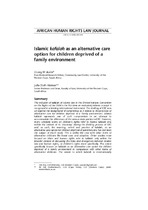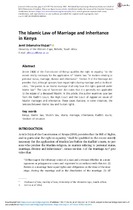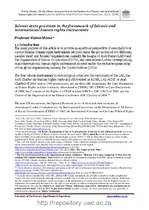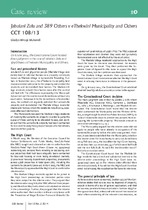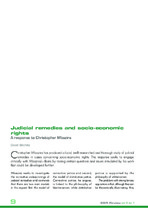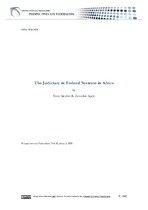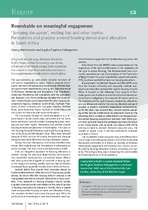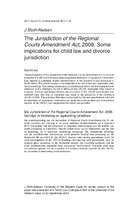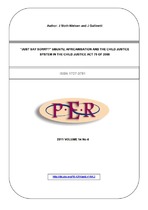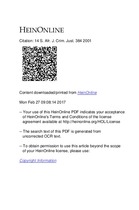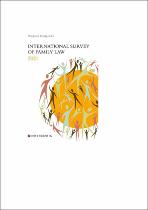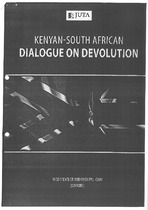Browsing Faculty of Law by Title
Now showing items 409-428 of 902
-
Islamic kafalah as an alternative care option for children deprived of a family environment
(Juta Law, 2014)The inclusion of kafalah of Islamic law in the United Nations Convention on the Rights of the Child is the first time an exclusively Islamic concept is recognised in a binding international instrument. The drafting of CRC ... -
The Islamic Law of Marriage and Inheritance in Kenya
(Cambridge University, 2021)Article 24(4) of the Constitution of Kenya qualifies the right to equality “to the extent strictly necessary for the application of” Islamic law “in matters relating to personal status, marriage, divorce and inheritance”. ... -
Islamic mode of estate distribution in South Africa
(Jordan Publishing LexisNexis, 2016)It has been argued by some academics that the Islamic law of intestate succession discriminates against females due to its unequal distribution of shares in favour of males.' The general example used in this regard is when ... -
Islamic state practices in the framework of Islamic and international human rights instruments
(Electronic Publishing, 2016)The main purpose of this article is to provide an analytical perspective of essentially four current Islamic human rights instruments adopted under the protection of two different, parallel 'Arab' and 'Islamic' organisations, ... -
Jabulani Zulu and 389 Others v eThekwini Municipality and Others CCT 108/13
(ESR Review : Economic and Social Rights in South Africa, 2014)On 6 June 2014, the Constitutional Court handed down judgment in the case of Jabulani Zulu and 389 Others v eThekwini Municipality and Others. -
Judicial remedies and socio-economic rights : a response to Christopher Mbazira
(ESR Review : Economic and Social Rights in South Africa, 2008)Christopher Mbazira has produced a lucid, well-researched and thorough study of judicial remedies in cases concerning socio-economic rights. This response seeks to engage critically with Mbazira's claims by raising certain ... -
The Judiciary in Federal Systems in Africa
(Perspectives on Federalism, 2020)Eight states in Africa that have federal or federal-type government systems and most of these federations emerged in the post-Cold War period. The African federations are in various degrees characterised by a limited ... -
'Jumping the queue', waiting lists and other myths : perceptions and practice around housing demand and allocation in South Africa
(ESR Review : Economic and Social Rights in South Africa, 2014)On 13 and 18 June 2014, the Socio-Economic Rights Project of the Community Law Centre, University of the Western Cape, held roundtable discussions in Cape Town and Johannesburg on housing demand and allocation in South Africa. -
Jumping the Queue', Waiting Lists and other Myths: Perceptions and Practice around Housing Demand and Allocation in South Africa
(Community Law Centre, University of the Western Cape, and Socio-Economic Rights Institute of South Africa, 2013)Since 1994 the South African government, through its National Housing Subsidy Scheme (NHSS), has embarked on the large-scale provision of state-subsidised housing to low-income households across the country. Over 2 million ... -
The jurisdiction of the Regional Courts Amendment Act, 2008: some implications for child law and divorce jurisdiction
(Faculty of Law, University of the Free State, 2011)The promulgation of the Jurisdiction of the Regional Courts Amendment Act, 31 of 2008 (hereafter the JRCAA) in 62 large urban magisterial districts on 9 August 2010 (Women's Day) heralds a potentially drastic transformation ... -
"Just say sorry" Ubuntu and the Child Justice Act
(PER (Potchefstroom Electronic Law Journal), 2011)In the midst of concerns about serious offences committed by young people, the Child Justice Act is the first formal legislative step to introduce restorative justice in South Africa, and promotes reconciliation and problem ... -
Just say sorry?" Ubuntu, Africanisation and the child justice system in the Child Justice Act 75 of 2008
(North-West University, 2011)In the midst of concerns about serious offences committed by young people, the Child Justice Act is the first formal legislative step to introduce restorative justice in South Africa, and promotes reconciliation and problem ... -
The Juvenile Justice Law Reform Process in South Africa: Can children's rights approach carry the day?
(Quarterly Law Review, 1999)The impetus for juvenile justice law reform sprang originally from concern for the plight of child detainees in the dark days of apartheid in the 1980s. Children, who were at the forefront of the struggle for democratic ... -
Juvenile justice review 1994-1995
(South African Journal of Criminal Justice, 1995)This review of the state of juvenile justice in South Africa introduces a new section to this journal in which annual developments relating to law and policy in the field of juvenile justice will be examined. Juvenile ... -
Juvenile justice review 1996
(South African Journal of Criminal Justice, 1996)This review follows the 1995 review, the first in this journal, and similarly reviews the period until 30 September 1996. In the year presently under review the principle focus of juvenile justice concern was yet again the ... -
Juvenile justice review 1997
(South African Journal of Criminal Justice, 1998)The 1997 juvenile justice review charts developments in juvenile justice law in South Africa from November 1996 until October 1997. The most significant development during 1997 was the release of the issue paper on Juvenile ... -
Juvenile justice review 1998
(South African Journal of Criminal Justice, 1999)The 1998 Juvenile Justice Review charts developments in juvenile justice law and practice in South Africa from October 1997 until October 1998. However, the release of the South African Law Commission discussion paper on ... -
Juvenile justice review 1999-2000
(South African Journal of Criminal Justice, 2001)The two years covered in this review have seen major developments in the juvenile justice sphere. Not only have several important judicial decisions been handed down, but the process of law reform has advanced significantly ... -
Kenya Kenyan Kadhis’ courts and their application of the Islamic law of divorce and distribution of property at the dissolution of marriage
(Cambridge University Press, 2021)Kenya does not have a State religion. Muslims are estimated to constitute than 10% of the Kenyan population. The ‘Kenyan Islamic practice … is predominantly Sunni with a Shafi intellectual tradition.’ However, there are ... -
Kenya-South Africa dialogue on devolution
(JUTA and company, 2016)In a radical break with its past, democratic South Africa established a system of devolution that was confirmed in the 1996 Constitution. In reaction to a system of highly centralised government that had seen the abuse of ...

